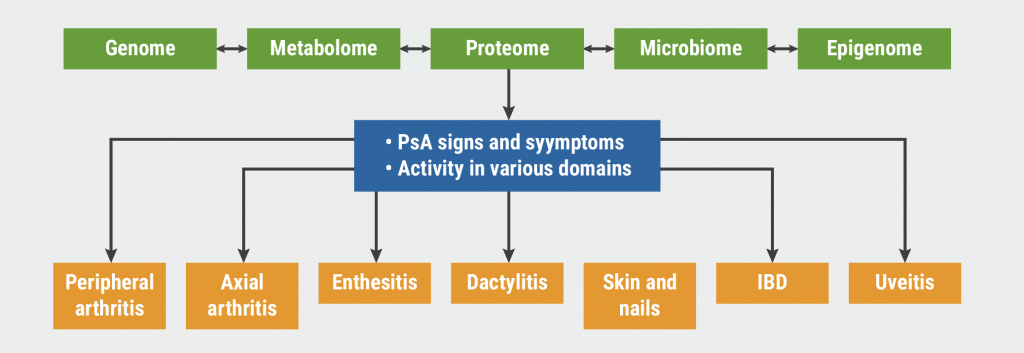https://doi.org/10.55788/82145f3a
The EULAR recommendations for the pharmacological treatment of rheumatoid arthritis (RA) advise applying a predefined treat-to-target (T2T) strategy. If this target is not achieved with csDMARD, adding a TNFi or a JAK inhibitor (JAKi) is recommended for patients with unfavourable prognostic factors. The PerfectRA study, presented by Dr Mart van de Laar (University of Twenthe, The Netherlands), aimed to demonstrate in a real-life setting the non-inferiority, and possibly superiority, of baricitinib compared with TNFi after failure of csDMARDs [1]. Participants had to be pretreated according to T2T principles and had a disease duration of <5 years. They were randomised to open-label treatment with either baricitinib or a TNFi and were followed up for 48 weeks. The study's primary endpoint was the non-inferiority of baricitinib versus TNFi in terms of the number of patients achieving an ACR50 response at week 12. The non-inferiority margin for baricitinib was set at -12%. In the case of non-inferiority achievement, a superiority analysis was planned.
Included for analysis were 199 patients who received a first dose of TNFi (n=102) or baricitinib (n=97). Baseline characteristics were comparable between both groups. Baricitinib was non-inferior and statistically superior to TNFi in reaching the primary endpoint. At 12 weeks, the Dutch researchers also found that Disease Activity Score in 28 joints (DAS28) remission (defined as DAS28 with C-reactive protein <0.6) was achieved by 74% of patients in the baricitinib group and 47% of those in the TNFi group (P<0.001). All secondary clinical and PRO measures over the study period of 48 weeks showed better responses, most often statistically superior, of baricitinib over TNFi.
Moreover, drug surveillance favoured baricitinib. Radiological outcomes did not differ significantly in the 2 groups, with only very few patients showing progression over 48 weeks. Baricitinib was generally well tolerated, and no new safety signals for either intervention were noted.
- Van de Laar M, et al. Baricitinib versus TNF-inhibitors in patients with active rheumatoid arthritis after failure of csDMARDS: a pragmatic, multicenter, real-life study in a treat-to-target setting. 0450, ACR Convergence 2023, 10–15 November, San Diego, USA.
- Smolen JS, et al. Ann Rheum Dis. 2023;82(1):3-18.
Medical writing support was provided by Michiel Tent.
Copyright ©2023 Medicom Medical Publishers
Posted on
Previous Article
« Roxadustat shows increases in Hb regardless of prior roxadustat use in CKD Next Article
No need to avoid TNF inhibitors in RA-ILD? »
« Roxadustat shows increases in Hb regardless of prior roxadustat use in CKD Next Article
No need to avoid TNF inhibitors in RA-ILD? »
Table of Contents: ACR 2023
Featured articles
Ixekizumab resolves nail psoriasis better than adalimumab in PsA
IV secukinumab safe and effective for long-term treatment of active PsA
Rheumatoid Arthritis
Short-term glucocorticoid use increases the risk of MACE
Positive efficacy and safety results of novel BlyS/APRIL inhibitor in RA
Baricitinib superior to TNFi in patients with RA who failed csDMARDs
Lupus
Encouraging results of afimetoran in participants with cutaneous lupus
CAR-T cell therapy results in sustained lupus remission
Osteoarthritis
Repeat steroid injection in knee osteoarthritis possibly beneficial
Osteoporosis
Romosozumab tops denosumab in glucocorticoid users with high fracture risk
Psoriatic Arthritis
Ixekizumab resolves nail psoriasis better than adalimumab in PsA
IV secukinumab safe and effective for long-term treatment of active PsA
Apremilast in early oligoarticular PsA: phase 4 study results
Gout
Novel selective URAT1 inhibitor shows promise in gout
Fibrosing rheumatic diseases
Incidence and risk factors for new-onset interstitial lung disease
No need to avoid TNF inhibitors in RA-ILD?
Vasculitis
Reduced-dose glucocorticoids in GPA and MPA increase mortality
Related Articles

September 17, 2021
Psoriatic arthritis: Guidelines and best practice
September 17, 2021
Potential role of inflammation in cardiovascular comorbidity
© 2024 Medicom Medical Publishers. All rights reserved. Terms and Conditions | Privacy Policy

